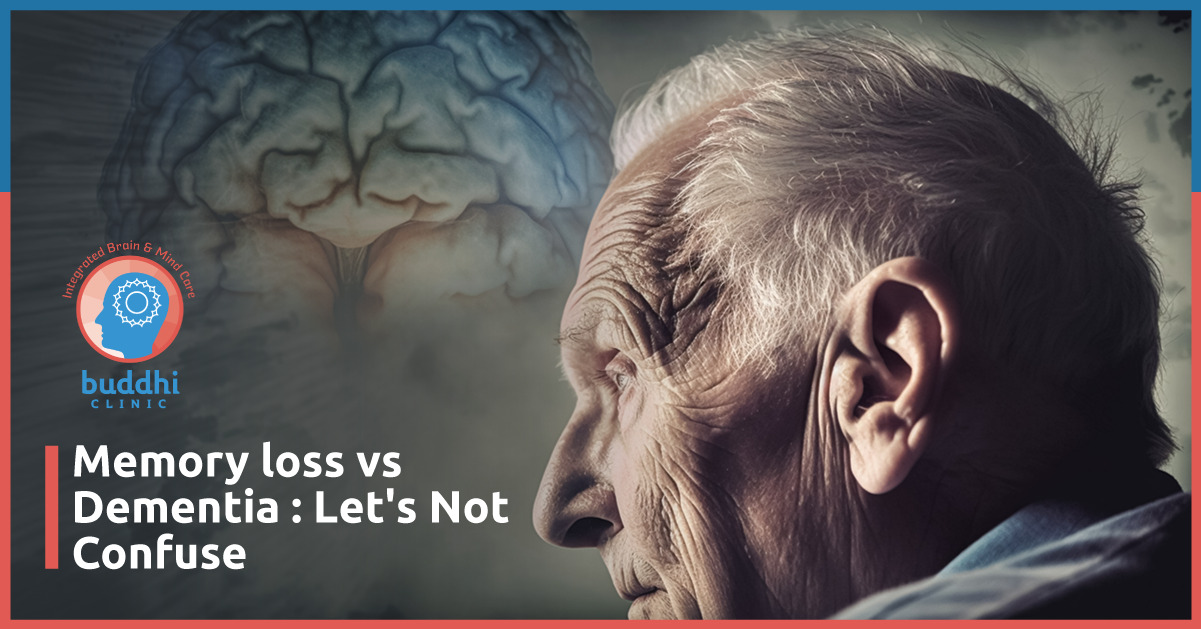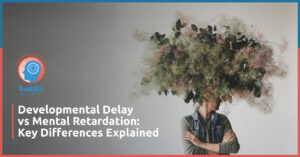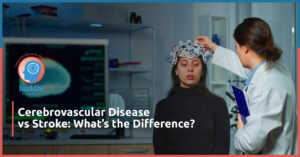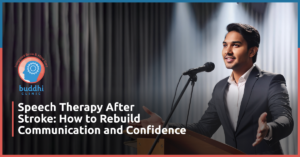Introduction
Forgetting where you placed your keys or struggling to recall a name is annoying, but is it a sign of dementia? The majority of people incorrectly blame random memory loss on dementia, resulting in unnecessary anxiety or delayed diagnosis. Memory loss is a normal part of aging, but dementia is a serious condition that affects cognitive function, behavior, and independence.
In this blog, we’ll explore the differences between memory loss vs dementia, how to recognize warning signs, and the treatment options available at Buddhi Clinic.
What is Memory Loss?
Memory loss refers to difficulty recalling information, events, or experiences. It can be temporary or long-term and may result from various factors, including aging, stress, lack of sleep, or medical conditions. Some common causes of memory loss include:
- Normal Aging: Occasional forgetfulness is common as one ages.
- Stress & Anxiety: Intense stress can damage memory functioning.
- Sleep Deprivation: Lack of enough sleep affects mental functions.
- Medication Side Effects: Certain medications can cause memory loss.
- Vitamin Deficiencies: Lack of essential nutrients like B12 can impair memory.
While mild forgetfulness is a natural process, persistent memory issues impacting daily life may require a doctor’s evaluation.
What is Dementia?
Dementia is a broad term for conditions that cause a loss of cognitive function severe enough to impact daily life. Dementia is not the same as simply memory loss, since it affects reasoning, language, and behavior. The most prevalent types of dementia are:
- Alzheimer’s Disease: The most common form, with memory loss and loss of intellectual function as symptoms.
- Vascular Dementia: Caused by reduced blood flow to the brain, most often due to stroke.
- Lewy Body Dementia: Associated with abnormal protein accumulation in the brain.
- Frontotemporal Dementia: Affects personality, behavior, and speech.
Dementia is permanent, that is, symptoms worsen with time. It can be slowed down by early treatment and diagnosis, and quality of life can be improved.
Memory Loss vs Dementia: Let’s Not Confuse Them
While memory loss and dementia may look similar on the surface, they are indeed two different conditions with different causes, courses, effects, and treatments. One should understand the differences to be able to intervene early and receive proper care.
1. Cause: What Causes Memory Loss vs Dementia?
Memory loss and dementia have different underlying causes:
- Forgetting: It may be a consequence of typical aging, stress, medication side effects, sleep deprivation, vitamin deficiency, or transient illness. Not forgetfulness is connected with dementia.
- Dementia: This is caused by disease and neurodegeneration of the brain, such as Alzheimer’s disease, vascular dementia, or Lewy body dementia. Dementia follows from widespread damage to brain cells, and thus it is a much more complex process than loss of memory.
In brief, there are reversible causes of memory loss, while dementia develops from progressive neurological illnesses.
2. Progression: Transient vs Irreversible Cognitive Impairment
The way in which each condition progresses over the long term is an important distinguishing criterion:
- Memory Loss: Memory loss in most cases is stable and can be reversed by proper treatment. If forgetfulness is secondary to stress, sleep disturbance, or side effects of medication, removal of the causative factor restores normal function.
- Dementia: Dementia progresses, or gets worse over time. It starts with mild cognitive impairment and ultimately leads to tremendous difficulty with memory, logic, and behavior. Unlike normal memory loss, dementia destroys brain function for months or years.
Grasping this distinction inspires an individual to seek the proper medical help at an early stage.
3. Impact: The degree to which daily life is disrupted
The extent of these conditions influencing the daily life varies:
- Loss of Memory: Mild forgetfulness is common, such as misplacing things or being unable to remember names for a brief period. The condition does not significantly impact daily life, however. Individuals can function in a regular fashion with very little alteration.
- Dementia: Dementia has a strong impact on everyday life. It harms thinking, decision-making, language, and basic activities like dressing or cooking. As the disease gets more severe, individuals will struggle to identify people they love or perform basic routines.
This is a critical distinction—if memory losses are happening with some regularity and are interfering with daily life, professional evaluation is indicated.
4. Treatment: Managing vs Medical Intervention
Treatment plans for dementia and memory loss are extremely varied:
- Loss of Memory: Lifestyle changes can help. Improving sleep, stress reduction, healthy diet, and mental stimulation (e.g., puzzles and reading) can enhance retention.
- Dementia: Dementia requires medical intervention. Although there is no cure, therapies attempt to slow progression and improve quality of life. Patients are prescribed medication, cognitive therapy, behavioral therapy, and specialty care by specialists.
Precise diagnosis is needed to determine whether lifestyle change alone is adequate or if more intricate treatment is necessary.
Key Takeaway
Memory loss and dementia can look similar at first glance, but they differ in etiology, course, effect, and management. Frequent forgetfulness does not necessarily equate to dementia, but persistent decline in cognitive ability should be evaluated by a professional.
Dementia Treatment at Buddhi Clinic
Buddhi Clinic is a dedicated dementia treatment center offering personalized care to improve cognitive function and well-being. Their treatment includes:
- Early Diagnosis & Assessment: Identification of dementia symptoms and underlying causes.
- Cognitive Therapy: Therapeutic exercises to improve memory and cognitive skills.
- Medication Management: Prescribing drugs to slow down progression.
- Holistic Care: Bringing together modern medicine and age-old therapies.
- Caregiver Support: Counseling families taking care of dementia care.
Conclusion
Dementia and memory loss are often confused, but understanding how they differ is crucial to proper care. It’s perfectly normal to forget things at times, but persistent decline in cognitive function must be treated by a physician. Early diagnosis and specialty care, like that at Buddhi Clinic, can help manage symptoms and maintain independence.
If you or someone you care about is experiencing memory issues, seeking expert guidance can be a great assistance.
FAQs
1. Is memory loss reversible?
Yes, in instances of memory loss due to reasons like stress, sleep deprivation, or vitamin deficiencies, memory loss can be reversed through medication and lifestyle changes.
2. How is dementia diagnosed?
Dementia is diagnosed by doctors using cognitive tests, brain imaging, and medical history assessments.
3. Is dementia inherited?
Some, like Alzheimer’s, are inherited, but lifestyle and environmental factor play a role too.
4. Can dementia be prevented?
There is no guarantee of prevention, but a healthy lifestyle, regular physical activity, and mental stimulation can reduce the risk.
5. If I suspect dementia in a loved one, what do I do?
There ought to be medical examination immediately. Early detection permits symptom control and enhanced quality of life.






